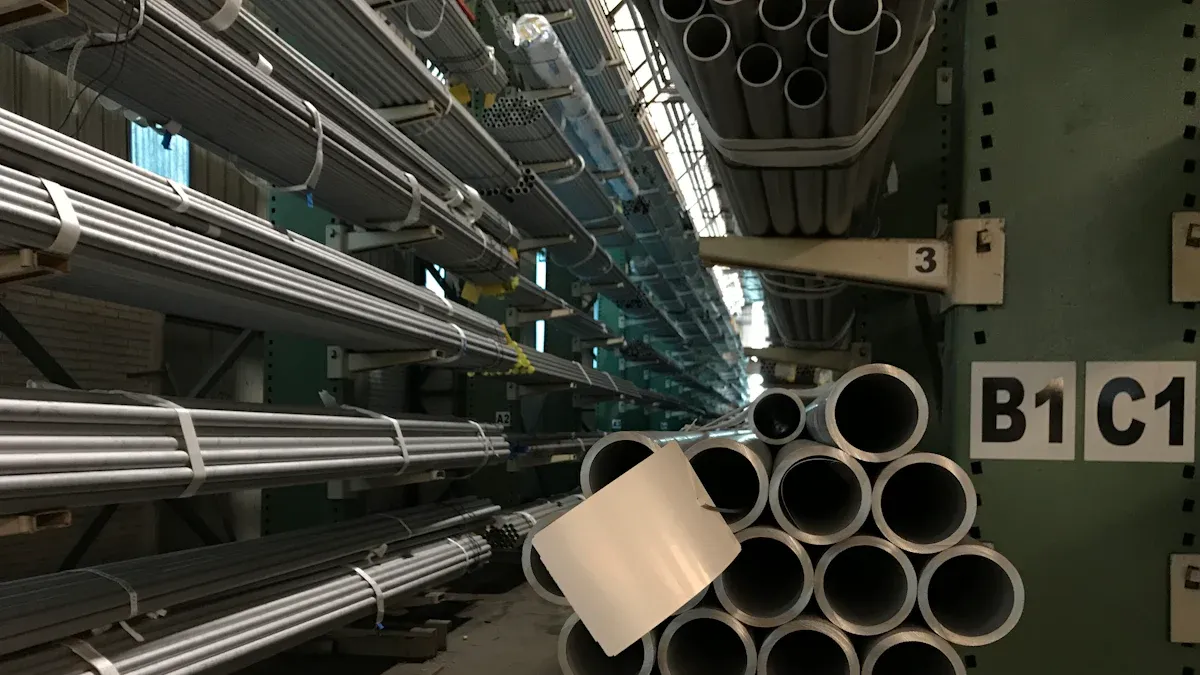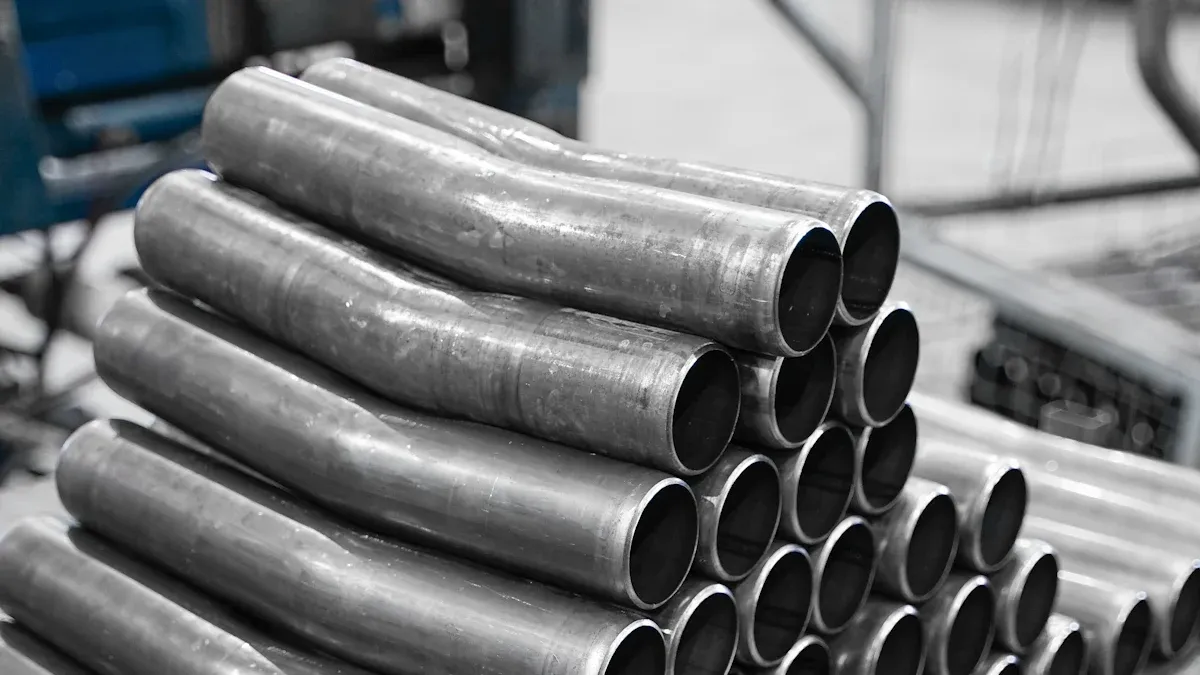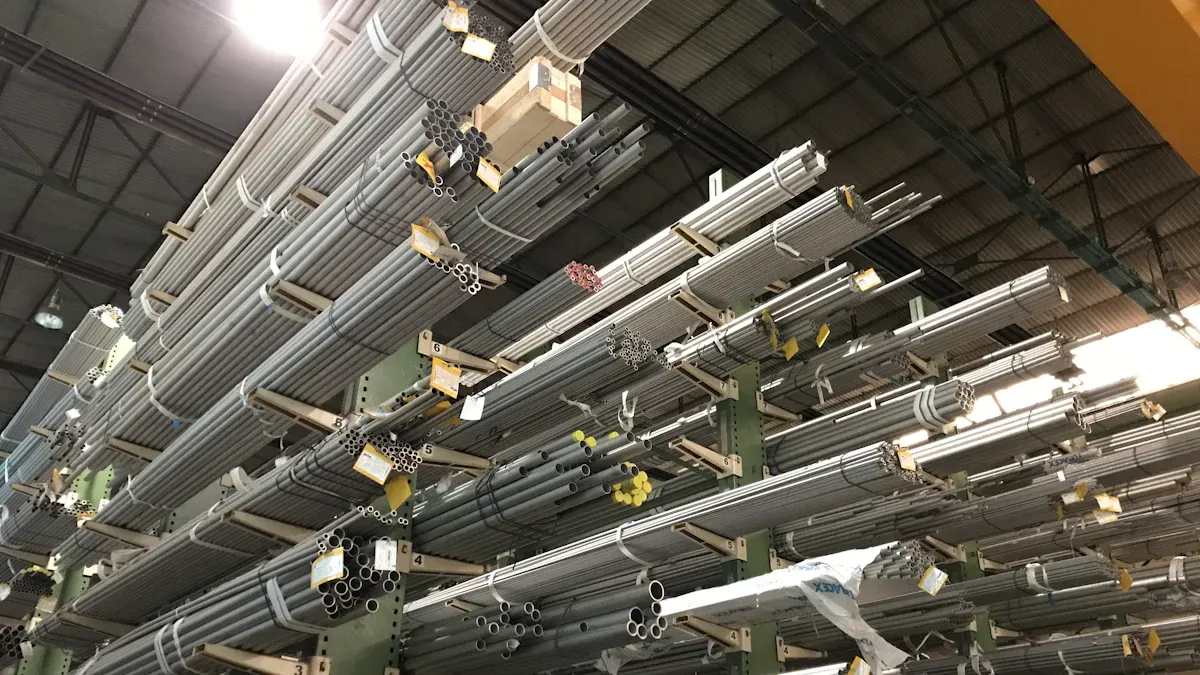How to Choose the Perfect Custom-Sized Nickel-Iron Alloy Tube

Selecting the right custom-sized nickel-iron alloy tubes ensures optimal performance in every application. These tubes offer unmatched versatility, making them indispensable for industries ranging from electronics to aerospace. Their unique composition provides superior durability and precision, which are critical for demanding environments. Choosing the wrong size or quality can lead to inefficiencies, increased costs, and even equipment failure. Understanding the benefits of custom tubing, including tailored dimensions and enhanced material properties, empowers businesses to achieve their goals efficiently. Prioritizing quality over shortcuts guarantees long-term success and reliability.
Key Takeaways
Nickel-iron tubes are strong and made to exact sizes. They work well for tough jobs.
Picking the right size, like width and thickness, is important for safety and good results in different industries.
These alloys resist rust, so they last longer in rough places and need less fixing.
Buying from trusted sellers gives you good quality and fast delivery, which helps your work run smoothly.
Choosing better quality instead of cheaper options saves money over time and makes the tubes work better.
Material Properties of Custom-Sized Nickel-Iron Alloy Tubes

Unique Characteristics of Nickel-Iron Alloys
Nickel-iron alloys stand out due to their exceptional properties, making them a preferred choice for custom tubing in demanding environments. These alloys exhibit unique electrical resistivity characteristics under varying pressure conditions. This behavior has been extensively studied, particularly in geological contexts, such as simulating conditions in Earth's core. Their ability to maintain stable performance under extreme conditions ensures reliability across a wide array of tubing varieties.
Additionally, nickel-iron alloys offer remarkable thermal stability. They can withstand high temperatures without significant deformation, making them ideal for applications in aerospace and electronics. Their magnetic properties further enhance their versatility, especially in precision instruments and electromagnetic shielding. By leveraging these unique traits, industries can achieve superior performance and durability in their operations.
Corrosion Resistance and Permeability
Corrosion resistance is a critical factor when selecting custom nickel alloy tubing, especially for environments exposed to harsh chemicals or extreme temperatures. Nickel-iron alloys excel in this area, outperforming many other materials. For instance, tests conducted in boiling solutions of magnesium chloride and lithium chloride demonstrate their superior resistance compared to standard alloys like Alloy 316.
Test Solution | Alloy 316 | SSC-6MO | Incoloy® Alloy 825 | Inconel® Alloy 625 |
|---|---|---|---|---|
42% Magnesium Chloride (Boiling) | Fail | Mixed | Resist | Resist |
33% Lithium Chloride (Boiling) | Fail | Resist | Resist | Resist |
26% Sodium Chloride (Boiling) | Fail | Resist | Resist | Resist |
In addition to corrosion resistance, nickel-iron alloys exhibit excellent permeability, which is essential for applications requiring precise control of magnetic fields. This property makes them indispensable in industries like telecommunications and medical imaging. By choosing a corrosion-resistant alloy with high permeability, businesses can ensure long-term reliability and efficiency in their operations.
Common Grades and Their Applications
Nickel-iron alloys are available in various grades, each tailored to specific applications. For example, Incoloy® 825 is widely used in chemical processing due to its resistance to sulfuric acid. The table below highlights its performance compared to other alloys in boiling sulfuric acid solutions:
Alloy | Corrosion Rate in Boiling Laboratory Sulfuric Acid Solution Mils/Year (mm/a) | ||
|---|---|---|---|
10% | 40% | 50% | |
316 | 636 (16.2) | >1000 (>25) | >1000 (>25) |
Incoloy® 825 | 20 (0.5) | 11 (0.28) | 20 (0.5) |
Other grades, such as Inconel® 625, are designed for high-temperature environments, making them suitable for aerospace and power generation. Custom tubing made from these grades ensures compatibility with a wide array of tubing varieties, offering flexibility for diverse industrial needs. Selecting the right grade ensures optimal performance and cost-efficiency, whether for medical devices, electronics, or heavy machinery.
Matching Custom Tubing to Your Application
Assessing Industry-Specific Requirements
Every industry has unique demands that influence the choice of custom tubing. Selecting the right tubing ensures optimal performance and safety in specialized fields. For instance, the medical industry prioritizes precision and biocompatibility, while the automotive sector values durability and heat resistance. The table below highlights key requirements across various industries and their typical applications:
Industry | Key Requirements | Examples of Applications |
|---|---|---|
Medical Industry | Precision, safety, reliability, biocompatibility | IV lines, medical device components, sight glasses |
Food and Beverage | Safety, chemical resistance, non-reactive nature | Beverage dispensing, food processing, dairy production |
Industrial Manufacturing | Toughness, high-pressure resistance, corrosion resistance | Pneumatic systems, chemical processing, protective jacketing |
Automotive Sector | Durability, adaptability, heat resistance | Fluid transfer lines, electrical sleeving, lightweight components |
Agriculture and Irrigation | Weather resistance, flexibility, crack resistance | Irrigation systems, spray systems, equipment maintenance |
Energy and Utilities | Performance under pressure, harsh conditions | Water purification, vacuum lines, oil and gas applications |
Understanding these requirements allows businesses to select custom tubing that meets their operational needs. For example, aerospace tubing must withstand extreme temperatures and pressures, making nickel-iron alloys an excellent choice due to their thermal stability and strength.
Environmental and Operational Considerations
Environmental and operational factors play a critical role in determining the suitability of custom tubing. Corrosive environments, such as those involving exposure to chemicals or saltwater, demand materials with high corrosion resistance. Nickel-iron alloy tubes excel in these conditions, ensuring long-term reliability and reduced maintenance costs.
Operational conditions, including temperature, pressure, and mechanical stress, also influence tubing selection. For high-temperature applications, such as those in power generation or aerospace, nickel-iron alloys provide exceptional performance. Their ability to maintain structural integrity under extreme conditions ensures safety and efficiency. Businesses operating in harsh environments must prioritize materials that can endure these challenges without compromising performance.
Compatibility with Other Materials
The compatibility of nickel-iron alloy tubes with other materials enhances their versatility in industrial applications. These alloys exhibit thermal expansion properties that align with certain glass and ceramic materials. This makes them ideal for metal-to-glass fusion in hermetically sealed devices, which are essential in electronics.
Industries have successfully integrated nickel-iron alloy tubes into vacuum tubes, transistors, and semiconductors. These applications demonstrate their ability to create high-quality seals with excellent strength and hermeticity. By choosing compatible materials, businesses can ensure seamless integration and superior performance in their systems.
Dimensions and Their Role in Performance
Selecting the Right Diameter and Wall Thickness
Choosing the correct diameter and wall thickness is crucial for ensuring the performance and safety of nickel alloy tubing in various applications. The dimensions directly affect the tube's ability to withstand pressure, temperature, and mechanical stress. Engineers often rely on formulas and guidelines to determine the optimal wall thickness for specific scenarios.
Key Point | Description/Formula |
|---|---|
Pipe Material | Black steel with defined tensile strength. |
Design Pressure (P) | Pressure inside the pipe (e.g., psi or MPa). |
Outer Diameter (OD) | Measured diameter of the pipe (inches or mm). |
Allowable Stress (S) | Stress the material can handle (e.g., psi). |
Corrosion Allowance (CA) | Added thickness to account for corrosion (e.g., mm). |
Joint Efficiency (E) | Efficiency of welds or connections (0 < E ≤ 1). |
Wall Thickness Formula | t = P × OD / (2 × S × E) + CA |
Safety Factor | Consider additional safety margins for high-pressure systems. |
When selecting dimensions, industries must also consider pressure ratings and Standard Dimension Ratios (SDR). Lower SDR values indicate thicker walls, which enhance pressure resistance. Additionally, temperature ratings and environmental factors, such as chemical exposure, play a significant role in determining the right dimensions for specific applications.
Custom Lengths for Medical Tubing and Other Applications
Custom lengths offer significant advantages in specialized applications, particularly in medical tubing. Standard lengths may not always meet the unique requirements of medical devices or industrial systems. Customization ensures precision and adaptability, reducing waste and improving efficiency.
Specification | Details |
|---|---|
Standard Length | 62" (157 cm) |
Maximum Custom Length | 96" (longer lengths possible) |
Minimum Custom Length | 0.020" or less |
Medical tubing often requires tight tolerances and specific lengths to ensure compatibility with medical devices. For example, IV lines and catheter systems demand precise dimensions to maintain patient safety and device reliability. Custom nickel alloy tubing provides the flexibility needed to meet these stringent requirements, making it an ideal choice for healthcare applications.
Importance of Tolerances in Precision Applications
Tight tolerances are essential for precision applications, where even minor deviations can compromise performance. Industries such as aerospace, electronics, and medical rely on tubing with exact dimensions to ensure seamless integration and functionality.
Nickel alloy tubing excels in maintaining tight tolerances, offering consistent quality and reliability. For instance, in aerospace systems, tubes must fit perfectly within complex assemblies to prevent leaks or structural failures. Similarly, medical tubing requires precise tolerances to ensure compatibility with other components and maintain sterility.
By prioritizing tolerances, businesses can achieve superior performance and reduce the risk of costly errors. Custom-sized tubing tailored to specific dimensions ensures long-term success across diverse applications.
Manufacturing Processes for Custom Tubing

Welded vs. Seamless Nickel-Iron Alloy Tubes
Choosing between welded and seamless nickel-iron alloy tubes depends on the application’s requirements. Welded tubes are manufactured by rolling flat sheets of alloy into cylindrical shapes and welding the edges together. This process offers cost efficiency and faster production, making it ideal for industries requiring large quantities of tubing. Welded tubes also provide consistent wall thickness, which is crucial for applications like fluid transfer systems.
Seamless tubes, on the other hand, are created by extruding the alloy into a hollow cylindrical shape without any welding. This method eliminates the risk of weak points along the tube’s length, ensuring superior strength and durability. Seamless tubing is preferred for high-pressure environments, such as aerospace and power generation, where reliability is non-negotiable. Businesses must weigh the benefits of each type to select the most suitable option for their custom tubing needs.
Cold-Drawn vs. Hot-Finished: Key Differences
The manufacturing process significantly impacts the performance of nickel alloy tubing. Cold-drawn tubing undergoes processing at room temperature, resulting in tighter tolerances and smoother surfaces. This method enhances the tube’s mechanical properties, making it ideal for precision applications like medical devices and high-tech manufacturing tubing.
Hot-finished tubing, processed at elevated temperatures, offers greater flexibility in shaping and sizing. It is often used for larger-diameter tubes or applications requiring high-temperature resistance. While hot-finished tubes may lack the precision of cold-drawn ones, they excel in durability and cost-effectiveness. Understanding these differences helps industries choose the right process for their specific requirements.
Surface Finish and Its Impact on Performance
Surface finish plays a critical role in the functionality of custom tubing. A smooth finish reduces friction, improving fluid flow in applications like hydraulic systems and medical devices. It also minimizes the risk of corrosion by eliminating surface irregularities where contaminants can accumulate.
For nickel alloy tubing, manufacturers offer various finishes, including polished, brushed, and matte. Polished finishes are ideal for aesthetic applications, while brushed finishes provide enhanced grip and durability. Selecting the appropriate surface finish ensures optimal performance and longevity, especially in demanding environments.
Tip: Always consult with your supplier to determine the best surface finish for your application. A tailored finish can significantly enhance the efficiency and lifespan of your custom tubing.
Cost and Supplier Considerations
Balancing Budget and Quality
Finding the ideal custom tubing solution requires balancing cost and quality. Businesses often face the challenge of staying within budget while ensuring the tubing meets performance standards. High-quality nickel-iron alloy tubes may have a higher upfront cost, but their durability and reliability reduce long-term expenses. Inferior materials can lead to frequent replacements, downtime, and inefficiencies, which ultimately increase operational costs.
To make informed decisions, companies should evaluate the total cost of ownership. This includes initial purchase price, maintenance expenses, and the tubing's lifespan. Investing in premium materials ensures consistent performance, especially in demanding applications. By prioritizing quality, businesses can achieve better results and avoid costly setbacks.
Evaluating Supplier Customization Capabilities
A reputable supplier plays a crucial role in delivering the ideal custom tubing solution. Suppliers with advanced customization capabilities can tailor tubing to meet specific requirements, such as unique dimensions, surface finishes, or grades. This flexibility ensures compatibility with diverse applications, from medical devices to industrial systems.
When evaluating suppliers, businesses should consider their ability to handle complex orders. Suppliers with state-of-the-art manufacturing processes and skilled teams can produce tubing that meets tight tolerances and industry standards. Additionally, reviewing customer testimonials and case studies provides insight into the supplier's expertise and reliability. Choosing a supplier with proven customization capabilities ensures the tubing aligns perfectly with operational needs.
Ensuring Consistent Quality and Timely Delivery
Consistency and punctuality are critical when businesses order custom tubing. Delays in delivery can disrupt production schedules, while inconsistent quality can compromise performance. A reputable supplier prioritizes quality control and adheres to strict timelines, ensuring businesses receive reliable products on time.
To ensure consistent quality, suppliers should implement rigorous testing procedures. This includes verifying material properties, dimensions, and surface finishes. Companies should also inquire about the supplier's quality assurance certifications, such as ISO standards. Reliable suppliers maintain transparent communication throughout the order process, providing updates and addressing concerns promptly.
By partnering with a supplier committed to quality and timely delivery, businesses can streamline operations and achieve long-term success. This approach minimizes risks and ensures the tubing performs optimally in its intended application.
Selecting the perfect custom-sized Nickel-Iron alloy tube involves evaluating critical factors like material properties, precise dimensions, manufacturing methods, and cost considerations. Each decision impacts the tube's performance and longevity in its intended application.
Tip: Partnering with a trusted supplier ensures consistent quality, timely delivery, and tailored solutions that meet your unique needs.
By prioritizing quality over shortcuts, businesses can achieve long-term success and operational efficiency. Investing in reliable materials and expert craftsmanship guarantees optimal results, even in the most demanding environments.
FAQ
What are the key benefits of using custom-sized Nickel-Iron alloy tubes?
Custom-sized Nickel-Iron alloy tubes offer precise dimensions, superior corrosion resistance, and excellent thermal stability. These features ensure optimal performance in demanding applications like aerospace, medical devices, and industrial systems. Tailored tubing reduces waste, enhances efficiency, and guarantees compatibility with specific operational requirements.
How do I determine the right dimensions for my application?
To select the correct dimensions, consider factors like pressure, temperature, and mechanical stress. Use formulas to calculate wall thickness and diameter based on your application’s requirements. Consulting with a trusted supplier ensures accurate recommendations tailored to your needs.
Tip: Always account for safety margins when determining dimensions.
Are seamless tubes better than welded ones?
Seamless tubes provide superior strength and durability, making them ideal for high-pressure environments. Welded tubes, however, are cost-effective and suitable for applications requiring consistent wall thickness. The choice depends on your application’s specific demands and budget.
How can I ensure the quality of my custom tubing?
Partner with a supplier that follows strict quality control processes. Look for certifications like ISO standards and inquire about testing procedures for material properties, dimensions, and finishes. Reliable suppliers provide consistent quality and transparent communication.
Why is surface finish important for Nickel-Iron alloy tubes?
Surface finish impacts performance by reducing friction, improving fluid flow, and preventing corrosion. A smooth finish ensures efficiency in hydraulic systems and medical devices. Selecting the right finish enhances the tube’s lifespan and functionality in demanding environments.
Note: Consult your supplier to choose the best surface finish for your application.
See Also
Choosing the Right Nitinol Tubing Supplier for You
A Comprehensive Guide to Choosing Nitinol Tubing
The Effect of Cyclic Life Testing on NiTi Tubing
Finding the Most Cost-Effective 2mm Nitinol Tubing Supplier
Why NiTi Tubes Revolutionize Medical and Aerospace Industries

